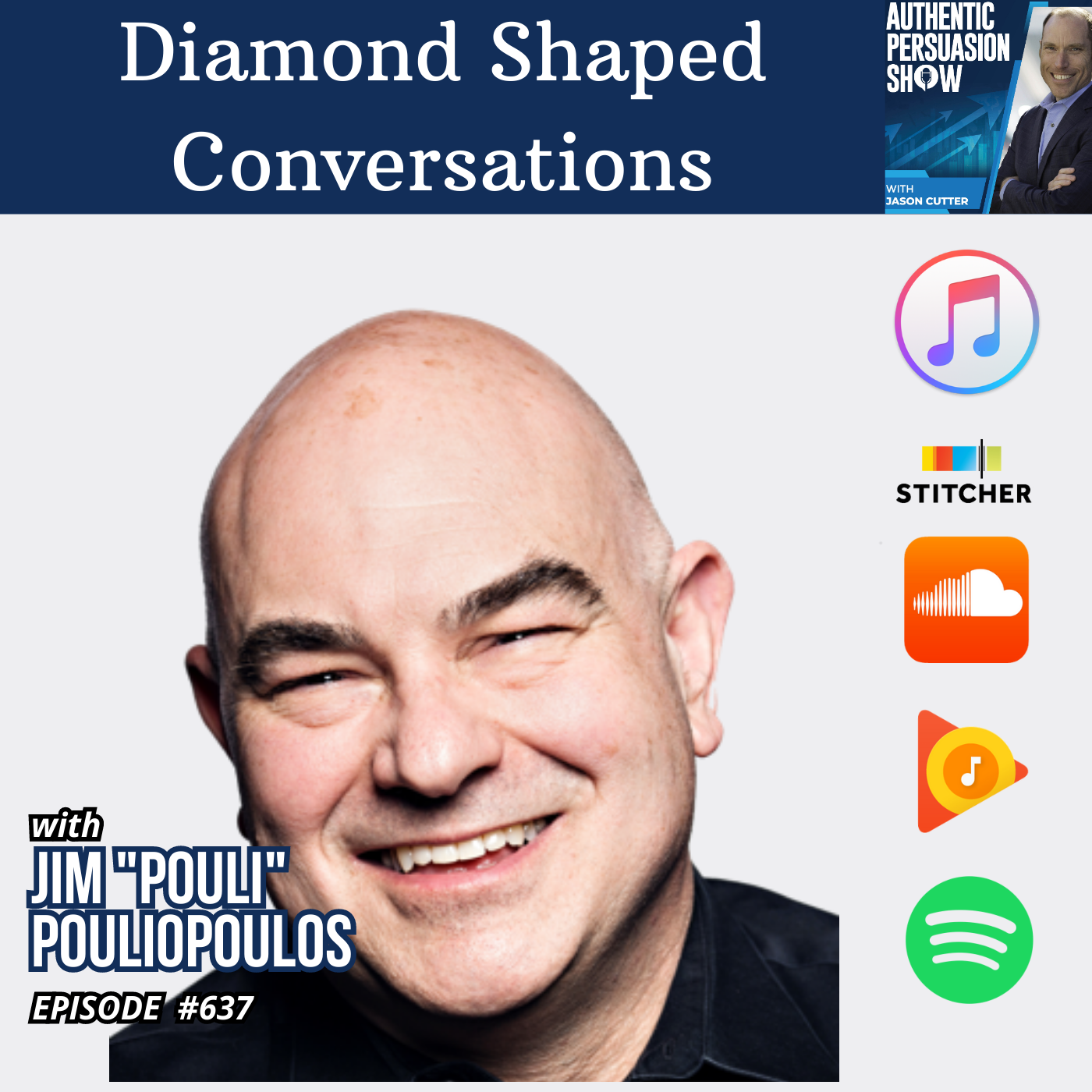Episode Transcript
Steven Norman: Authenticity and selling with authentic persuasion, what does that mean? Like it's authenticity thrown around a lot. I think it's a powerful concept and we should learn about it. But what does it mean to you?
Jason Cutter: To me, it's really a nice single word that encompasses a lot of various things. The first one is self awareness.
I think the fundamental thing is to be self aware. What's your strengths, what's your weaknesses, what your fears are. And then also in this part is super important is why do you want to be successful? Why do you want to do something? Why do you want to accomplish something? If you're in sales, why do you want to sell?
Why do you want to hit your numbers? What are you going after and why is that important to you? Because sales is all about rejection. If it wasn't, it would be easy and everyone would do it. And so there's going to be roadblocks. It's going to be difficult. And so you have to know yourself really well.
And so there's that parse, right? Where self awareness is key. And then to me, the other part, which is where I've always found success, is I don't try to pretend to be anyone else. I'm not trying to pretend to be the person in the next desk over who sells in a different way and speaks a certain way. I don't try to pretend I've had different experiences.
The more I have found that I bring my authentic self and who I am, maybe I make mistakes, maybe I stumble, maybe I forget something. Maybe I talk about my past challenges. People like buying from real, authentic humans, not sales robots and not slick manipulators.
Steven Norman: Yes, I think that's pretty powerful, isn't it?
It goes for leadership as well, and when you're managing people, people will respond less to that corporate suit type of person, rabbiting the policy or something, right? And they're going to interact much better and be more open. With someone who's human. Yeah.
Jason Cutter: And I think, leadership success comes from that, right?
There's leaders out there in the world who will have success in getting people to follow them, even if they're not being authentic, even if not being truthful, even if their intentions aren't good, they'll do okay for a while, but it always ends and it ends poorly, right? At some point it will end in sales and in leadership, the more authentic you can be.
Even if you're not perfect, right? Nobody expects anyone to be perfect. They will follow you and it will last longer. That's the key I found with being a sales professional and successful long term is when you're authentic and you're doing leadership type skills and practices, even with your customers, it's a long game.
You're going to have a longer success instead of just like short bursts of success.
Steven Norman: How did you realize that? Was there something that, did you have some sort of aha moment? About the power of adapting that. Were you always on that path or were you?
Jason Cutter: No, definitely not always on that path. I got into sales and I wasn't really planning on it.
And I was 27 when I got my first, let's say real sales job. And then I changed companies years and years later, and I was on the operation side because I didn't want to be in sales anymore. And then the owner made me the VP of sales. So not only sales, but leading sales for the first time. And I had to figure it out.
And it was really in that role where I found the power, especially over the phone of being able to persuade people and get them out of. Their way out of their fear and to take action to purchase. And I really realized it. And with that being said, it wasn't until a long time later when I really analyzed it, looked back and said, what did I do that worked?
What have I taught other people unconsciously? I haven't, I didn't plan on teaching them this. I just taught them this. And then what was I actually doing this whole time? Yeah, absolutely.
Steven Norman: Absolutely. When we talk about authenticity, yeah, I did a lot of business in China. In the past, and I used to spend a lot of time there, and you get all these sort of rules and rituals you've got to go through with handing cards, and you've got to be polite to everyone, and the senior person has to sit somewhere and all of this stuff, and I came across someone, another Australian, who just totally ignored all of those protocols and he was just quite loud, and just said whatever came to his mind, And would put his arm around, the locals and this sort of thing, right?
Oh, that's a no. Yeah. Yeah, but he had huge success. They absolutely loved him because he was himself. He was authentic and people just gravitated to that, right? So it just goes to show you don't have to follow the rule. You don't have to be like someone else. Whereas the role model might be for someone going to China, oh, you follow all the protocols and everyone just looks like a robot then.
You can, yeah, I would really encourage people to be themselves, be their total selves when they come to work and when they're engaging with customers. And it's a pretty powerful concept.
Jason Cutter: Yeah. And I think the big key when you're telling me that story about the other gentlemen, and I reflect back on my life and the things that I've done, even some people would look at like forceful sales, but I'm just trying to help somebody get.
help them with a solution. And some people think, wow, you're really pushing that person. To me, the authentic piece and the persuasion piece comes down to intentions. If your intentions are, let's say, pure, correct. I don't, it's tough to say right or wrong, but if your intentions are focused on helping the other person and doing what you think is proper with the right.
Place coming from inside of you that will overcome mistakes that will overcome those, not doing the cultural things. Correct. Like when we've all had that friend who they're making mistakes, right? Whether they're dating the wrong person or, they're making the wrong choices in life and they ask for your opinion and you just tell them and you're authentic and you're real and you care about them so much.
Like you're just going to be real. You're not going to pretend. And that's really important. A lot of people shy away from that in sales, because again, they're worried about doing it a certain way that really holds people back in my opinion.
Steven Norman: Yeah, absolutely. All right. So let's talk about some of some other concepts.
I saw you wrote a blog or I know you're on your podcast. You talked about this concept of, selling holes, not drills, and it's a bit more nuanced than that, but maybe you could share your thoughts on that,
Jason Cutter: I didn't come up with that originally. It's gone around a bunch,
Steven Norman: but I thought you had a good take on it.
Yeah.
Jason Cutter: Yeah, the thing is that People don't buy drills. They don't buy hammers. They don't buy any tools. They buy the solution that they want, right? They want the hole in the wall. That's why they buy the drill, right? And if you extrapolate even further, they don't buy the hole. They buy because they need to put a, let's say, a, Bolt in the wall and they don't buy the, the bolts, they buy the fact that they need to hang a picture and they don't need to really hang the picture.
Their goal is to really make their significant other happy. And that's the end result. So they're buying a drill for peace and happiness in their relationship. Most sales people miss the mark by focusing on the drill or the hammer and the features and all the cool stuff it does without really understanding the person doesn't care about it, doesn't the person doesn't care about your diamond tipped drill and how well it's going to do it.
They want. What they want the end result. And so many salespeople miss that where they're just monologuing. They're basically reading off the brochure. They're focusing on the features. They're talking about how awesome they are and nobody cares. And then not to offend anybody, but nobody cares.
Everyone only cares about themselves. So that customer only cares about what they're going to get and the end result. And the more as a salesperson, you can focus on that, right? Instead of talking about you and how awesome you and your product is or your service is, ask questions, dig deep, dive deep with that prospect, figure out what they really want.
Once you do that, the drill sells itself, right? Then it's just instant. And then it's just, which one do I want? It's not, how much is it going to cost?
Steven Norman: Yeah, absolutely. So I like it because the point you're making is you go beyond even, I want to make a hole, right? Yeah, it's why do you want to make a hole and then what's behind that and you're starting to tap into psychology and someone's psychological motivation of wanting to be liked probably or wanting to do the right thing or maybe get promoted or Achieve their goals in their job, right?
Like when we're selling, B2B, we're selling some solution. It's not so much even having, the best solution. It's the solution that will help them, make their life easier in some way. Or
Jason Cutter: yeah, it's about when you're doing B2B, especially, and I've taught so many people this, it's what does your prospective customer, that marketing person, that tech person, maybe even CEO, like what are they waking up at two o'clock in the morning worried about?
And how can you solve that with your solution? Because the more you can get to that deep level, then again, you're not selling anything like that. Then the sales part and the negotiation part, it doesn't exist. Yeah, absolutely.
Steven Norman: All right. So we really got to get at that, what's in it for them. And the more layers we can uncover, I think the better situation we're going to be in.
And then we can play back our solution or our proposal. It can be in terms of what they want, right? And people are going to be much more receptive to that.
![[Replay] Future Proof Selling, with Steven Norman](https://episodes.castos.com/salesexperiencepodcast/images/Futureproof-Selling.png)


